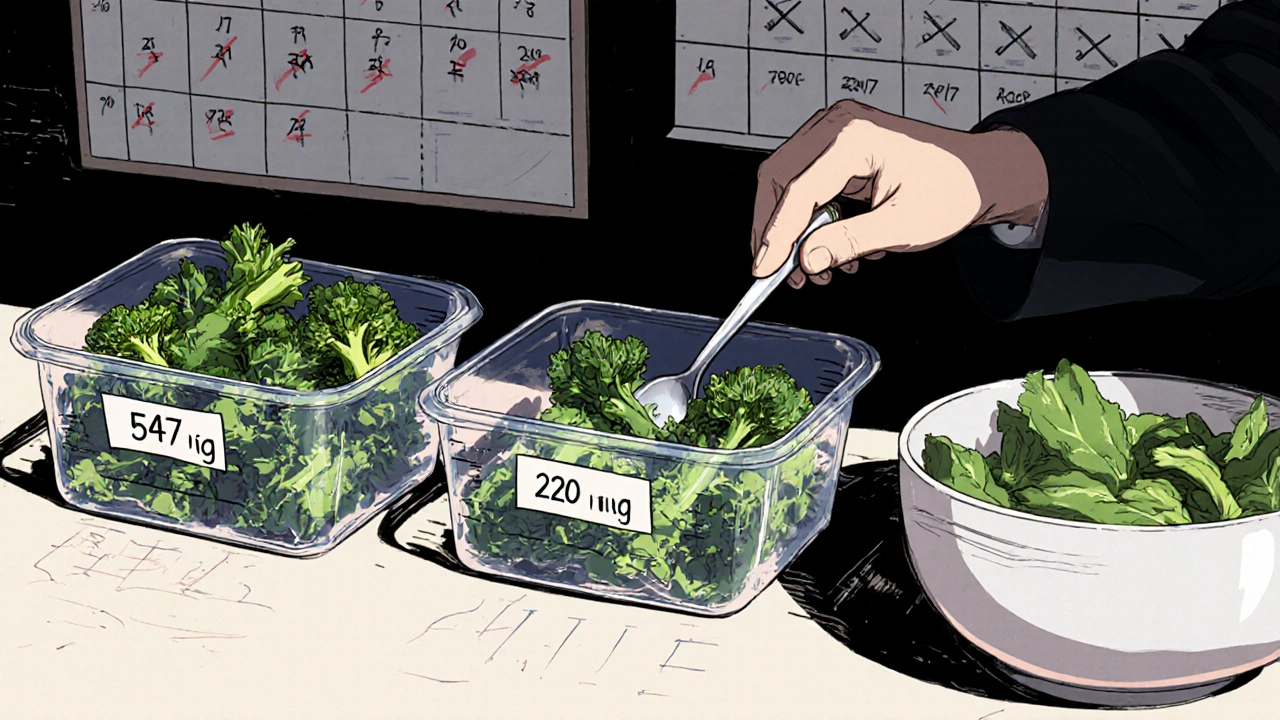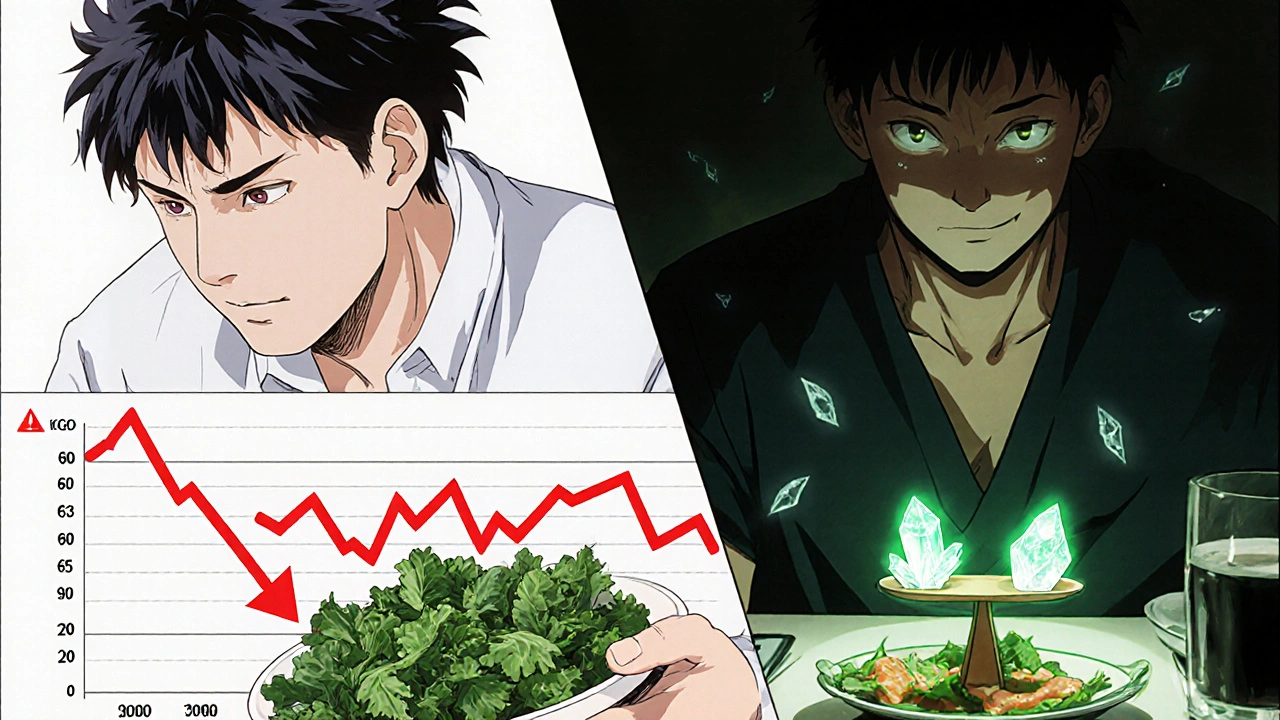Vitamin K Intake Calculator for Warfarin Patients
Daily Vitamin K Intake Calculator
Calculate your total vitamin K intake based on your food choices. Aim for 90-120 µg daily for stable INR levels.
Your Intake
Recommended: 90-120 µg dailyTips for consistent intake:
- Choose one consistent vitamin K food (like spinach or broccoli) and eat the same portion daily
- Measure portions with a kitchen scale or measuring cups
- Track your intake using this tool
- Don't change your vitamin K intake without consulting your doctor
When you're on warfarin, your diet isn't just about eating healthy-it's about eating consistent. One day you eat a big bowl of kale, the next day you skip the greens entirely, and suddenly your INR drops. Your blood starts clotting too fast. That’s not a coincidence. It’s chemistry. Vitamin K directly fights warfarin’s effect, and if your intake jumps around, so does your INR. The goal isn’t to avoid vitamin K. It’s to keep it steady.
Why Vitamin K Matters on Warfarin
Warfarin works by blocking your body’s ability to use vitamin K to make clotting factors. Without enough vitamin K, your blood takes longer to clot. That’s the point. But if you suddenly eat a lot of vitamin K-like a large serving of cooked spinach or collard greens-your body gets enough of it to override warfarin’s effect. Your INR plummets. Your risk of stroke or clot goes up. On the flip side, if you go days without vitamin K-rich foods, your body runs low. Warfarin then works too well. Your INR spikes. You could bleed too easily. A single meal with 800+ µg of vitamin K can drop your INR by 0.5 to 1.0 points in just 3-5 days. That’s enough to land you in the ER. The good news? You don’t need to stop eating greens. You just need to eat the same amount, every day.High-Vitamin K Foods You Need to Track
Not all vegetables are equal. Some are loaded. Others barely register. Here’s what matters most:- Cooked spinach: 889 µg per cup
- Cooked kale: 547 µg per cup
- Cooked collard greens: 772 µg per cup
- Cooked broccoli: 220 µg per cup
- Cooked Brussels sprouts: 219 µg per cup
- Cooked asparagus: 70 µg per half-cup
- Green beans: 14 µg per half-cup
What the Guidelines Actually Say
You’ve probably heard conflicting advice. Some doctors say “avoid green veggies.” Others say “eat them daily.” Which is right? The American Heart Association, the American College of Cardiology, and the American Society of Hematology all agree: Don’t restrict vitamin K. Maintain consistency. A 2019 study from the WARIS II trial showed patients who ate 90-120 µg of vitamin K every day-with little variation-had a time in therapeutic range (TTR) of 75-80%. That means their INR stayed in the safe zone most of the time. Patients who ate vitamin K randomly? TTR dropped to 55-65%. That’s a huge difference in stroke risk. One patient on the American Heart Association’s support forum said: “I eat exactly one cup of baby spinach every morning. My TTR went from 52% to 81% in six months.” That’s not luck. That’s control.Why Restriction Doesn’t Work
Trying to avoid vitamin K sounds logical. But it backfires. Here’s why:- Accidental intake causes big swings. You eat a bite of broccoli at a restaurant. Your INR crashes.
- Stress, illness, or travel changes your eating habits. Suddenly you’re eating more greens or less. Your INR jumps.
- Antibiotics kill gut bacteria that make vitamin K2. If you’re on antibiotics, your vitamin K drops-even if you eat the same food. That can raise your INR unexpectedly.

How to Build a Consistent Routine
You don’t need to be a nutritionist. You just need a simple system.- Pick one high-vitamin K food you like. Spinach, kale, or broccoli. Stick to it.
- Choose a portion size. One cup cooked. Or half a cup. Measure it.
- Eat it every day, at the same meal. Breakfast works well-it’s easier to remember.
- Keep the rest of your diet normal. No need to cut out other foods.
- Use an app like CoumaDiet or MyFitnessPal to log your intake. They’re accurate and easy.
What to Avoid
Some things are easy to miss:- Supplements: Multivitamins, green powders, and fish oil blends often contain vitamin K. Check labels. If it’s listed, skip it unless your doctor says otherwise.
- Herbal teas: St. John’s Wort, ginseng, and green tea can interfere with warfarin. Avoid them.
- Alcohol: More than 2 drinks a day can raise your INR. Stick to moderation.
- Large meals when you’re sick: If you’re ill and eat less, your INR can rise. Tell your doctor if you’re not eating for more than a day.
Tools That Help
The best anticoagulation clinics use tech to keep patients stable. You can too.- CoumaDiet app: Tracks vitamin K in over 1,000 foods. Syncs with your INR logs.
- INR Tracker Pro: Used by clinics. Predicts dose changes based on your food and INR history.
- Food diary: Paper or digital. Write down what you eat. Even just the greens. It makes patterns obvious.

What If You Mess Up?
You’re human. You’ll have slip-ups. A holiday dinner with too much kale. A salad you didn’t know had spinach. Don’t panic. Don’t double your warfarin dose. Don’t skip your next INR test. Instead:- Call your anticoagulation clinic. Tell them what you ate.
- Get your INR checked sooner than scheduled.
- Return to your normal routine the next day.
Warfarin vs. Newer Blood Thinners
Newer drugs like apixaban and rivaroxaban don’t care about vitamin K. You can eat whatever you want. So why still use warfarin? Because it’s cheap. Generic warfarin costs $4-$10 a month. The new drugs cost $3,500 a year. For many people, especially older adults, that’s the deciding factor. Also, warfarin can be reversed quickly with vitamin K or fresh plasma if there’s bleeding. The newer drugs don’t have that luxury. So if you’re on warfarin, you’re not stuck with outdated care. You’re managing a powerful tool-with a simple rule: eat the same amount of vitamin K every day.Final Takeaway
You don’t need to be perfect. You just need to be predictable. Pick one serving of one vitamin K food. Eat it daily. Track it. Don’t change it unless your doctor tells you to. That’s it. The science is clear. Consistency beats restriction. Stability beats fear. Your INR will thank you.Can I eat spinach if I’m on warfarin?
Yes, you can eat spinach-but keep the amount the same every day. One cup of cooked spinach has nearly 900 µg of vitamin K. If you eat it daily, your body adjusts to it. If you eat it one day and skip it the next, your INR will swing dangerously. Consistency is key.
Should I avoid all green vegetables on warfarin?
No. Avoiding green vegetables is outdated advice. Studies show patients who restrict vitamin K have more unstable INRs. The current guidelines recommend eating a consistent amount of vitamin K-rich foods daily-typically 90-120 µg-to maintain stable anticoagulation.
Why does cooking spinach increase vitamin K?
Cooking reduces the volume of spinach, so you eat more of it per cup. One cup of raw spinach has about 145 µg of vitamin K. When you cook it, it shrinks down to a quarter of its size-but the vitamin K doesn’t disappear. So one cup of cooked spinach contains nearly 900 µg-six times more. That’s why portion size and preparation matter.
Can antibiotics affect my INR?
Yes. Antibiotics kill gut bacteria that produce vitamin K2, which your body uses for clotting. This can lower your vitamin K levels and raise your INR-even if your diet hasn’t changed. Always tell your doctor if you’re on antibiotics while taking warfarin.
What’s the best way to track vitamin K intake?
Use a food-tracking app like CoumaDiet or MyFitnessPal. These apps use USDA data and can log vitamin K content accurately. Alternatively, keep a simple written log of your daily greens. Writing it down helps you notice patterns and stay accountable.
How long does it take to stabilize on a consistent vitamin K diet?
Most people see improvement in INR stability within 8-12 weeks. Each month, your time in therapeutic range (TTR) typically improves by about 5%. The key is sticking with the same routine-no matter what. After three months, many patients report fewer INR checks and less anxiety about their diet.
Is vitamin K supplementation safe on warfarin?
Under medical supervision, yes. Studies show that taking 100-150 µg of vitamin K daily can actually stabilize INR in patients with unstable results. But never start a supplement without talking to your doctor first. Unsupervised supplementation can be dangerous.


Jeanette Case
November 1, 2025 AT 11:46OMG I JUST ATE A WHOLE BOWL OF KALE SALAD AND MY INR DROPPED TO 1.9 😱 I THOUGHT I WAS BEING HEALTHY!! THANK YOU FOR THIS POST!!
Rob Giuffria
November 3, 2025 AT 02:36Of course the medical establishment says ‘just eat the same amount every day’ - because it’s easier than admitting they gave you a drug that turns your fridge into a minefield. You’re not just managing warfarin. You’re managing a life sentence of food math. 🙄
Barnabas Lautenschlage
November 4, 2025 AT 14:46It’s fascinating how such a simple concept - consistency - has such profound clinical implications. The body doesn’t respond well to volatility, whether it’s in medication dosing, sleep patterns, or dietary intake. Vitamin K’s antagonism with warfarin isn’t a bug; it’s a feature of the pharmacology, and the solution isn’t restriction but rhythm. The 2019 WARIS II data is compelling, and I’m glad to see it being translated into practical advice. Many patients don’t realize that their INR swings aren’t random - they’re predictable, if you track your intake. The real breakthrough isn’t the app or the chart - it’s the mindset shift from fear to routine.
Leonard Buttons
November 4, 2025 AT 20:05bro i just started using coumadiet and holy crap it actually works. i was eating spinach one day and then salad with romaine the next and my numbers were all over the place. now i eat 1 cup cooked spinach every morning with my eggs. my last inr was 2.4. no more panic calls to my nurse. also, stop drinking green tea. it’s a sneaky one.
Adrian Clark
November 6, 2025 AT 00:59So let me get this straight - I can’t have a ‘healthy’ salad anymore unless I weigh the kale like I’m baking a cake? And if I accidentally eat broccoli at a friend’s house, I might clot and die? Cool. Cool cool cool. Next you’ll tell me I need a vitamin K breathalyzer before I hug my mom.
Alice Minium
November 8, 2025 AT 00:49wait so if i eat raw spinach i'm fine? but cooked? nooo. so if i make a smoothie with spinach and banana, is that raw? what if i blend it? does it count as cooked? i'm so confused now. someone help.
Leonard Buttons
November 8, 2025 AT 16:24lol its still raw if you blend it. vitamin k doesn't care if its pureed. its still 145ug per cup raw. cooked is the problem because you cram more leaves into a cup. so smoothie = safe. cooked spinach = danger zone.
Janet Carnell Lorenz
November 9, 2025 AT 10:32My grandma’s on warfarin and she eats a cup of cooked kale every single night with her dinner. She’s had the same INR for 2 years. No apps, no tracking - just routine. Sometimes the simplest things work best. You don’t need to be perfect, just predictable.
Michael Kerford
November 11, 2025 AT 03:00This whole post is just a fancy way of saying ‘don’t eat vegetables.’ If you’re on warfarin, just take the new drugs. They’re expensive, sure - but at least you don’t have to become a nutritionist to survive dinner.
Geoff Colbourne
November 13, 2025 AT 02:32HAHAHA I KNEW IT. I told my doctor last year that vitamin K was a scam and I stopped eating greens entirely. My INR went to 7.0. I almost bled out. Turns out, not eating vitamin K is just as bad as eating too much. I’m now eating 1 cup of broccoli every day. I feel like a lab rat. But at least I’m alive.
Daniel Taibleson
November 14, 2025 AT 18:56The clinical evidence presented here is robust and aligns with current anticoagulation guidelines. The emphasis on dietary consistency over restriction is not only evidence-based but also psychologically sustainable. Patients who adopt a structured, repeatable dietary pattern report significantly lower anxiety and improved adherence. The integration of digital tools like CoumaDiet further enhances compliance and reduces the burden on clinical staff. This is an excellent synthesis of science and practical application.
Jamie Gassman
November 16, 2025 AT 09:14Who’s really behind this ‘eat the same greens every day’ advice? The pharmaceutical industry? Because the new drugs cost $3,500 a year - and if you’re eating consistent vitamin K, you’re sticking with warfarin. Coincidence? I think not. The FDA doesn’t care if you live or die - they care if your prescription stays profitable.
RaeLynn Sawyer
November 18, 2025 AT 01:45You’re not ‘managing’ warfarin. You’re being controlled by it. And now you’re supposed to eat the same exact amount of spinach every day like a robot? That’s not medicine. That’s punishment.